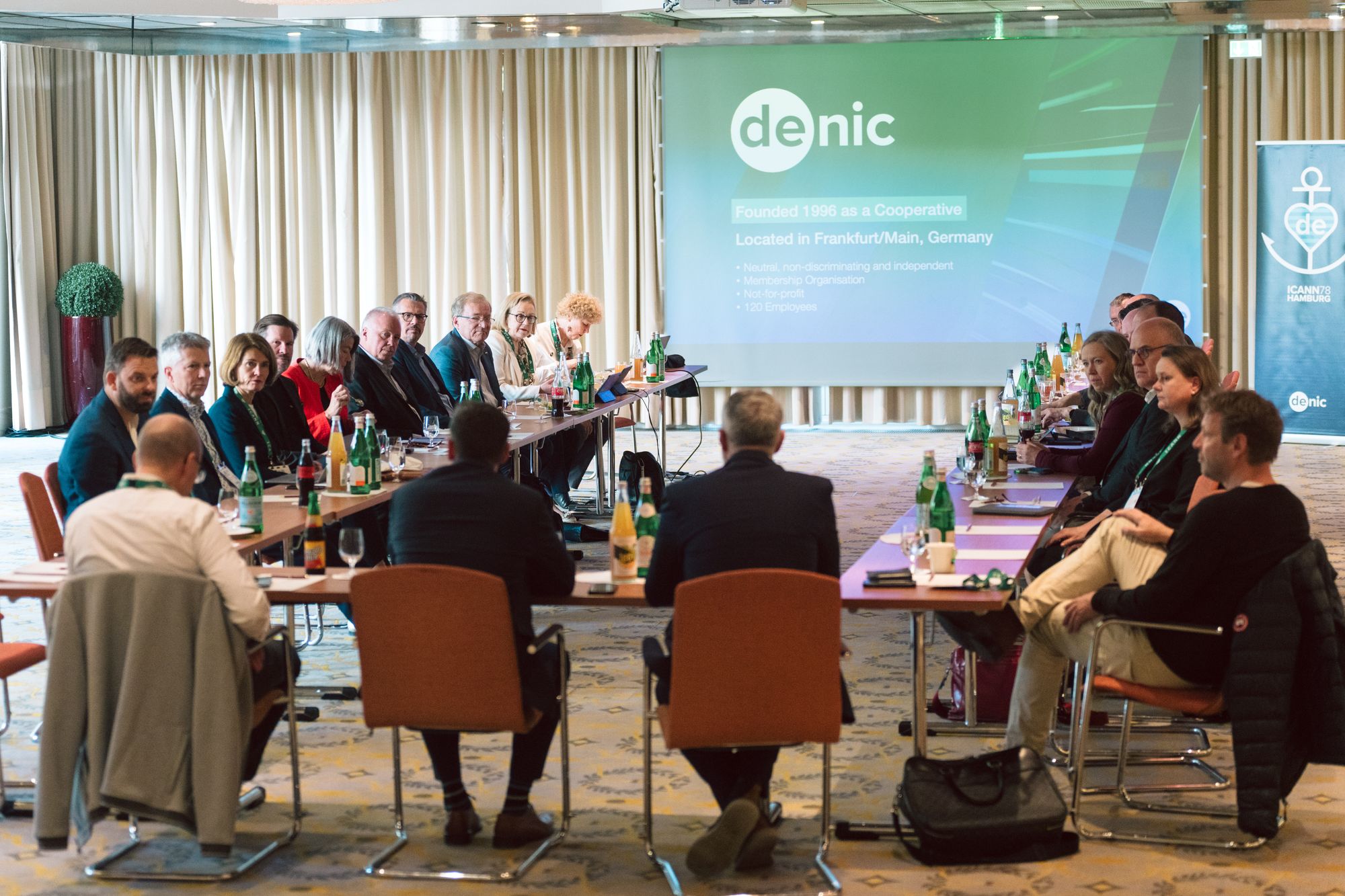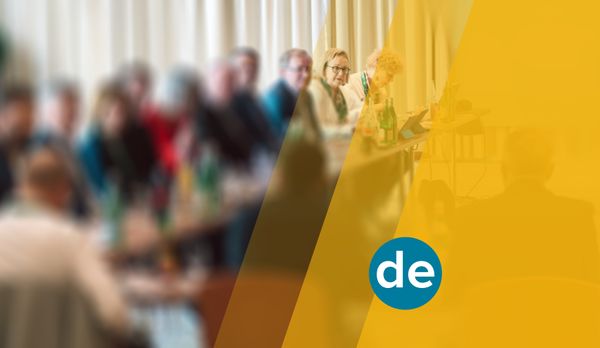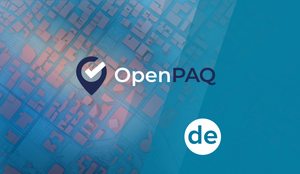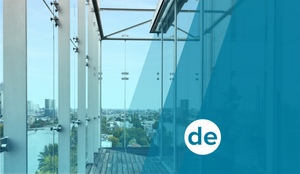Having reasonable influence on and being closely involved when it comes to shaping the rules for the Internet of the present and the future has always been a matter of priority for domain registries and TLD operators. And so has also been a cornerstone of DENIC's corporate strategy right from the start. The mission? Not contenting itself with the role of an average backbencher but act with clear objectives in mind, based on the vital premise to maintaining lasting relationships with other national and international institutions, organisations and associations that deal with the Internet. And carry on, while doing so, to ever support the preservation and further development of an Internet that remains free, open and secure.
It is therefore only logical that DENIC for many years has been a committed player in national, regional and international initiatives such as the Internet Governance Forum Germany (IGF-D), the European Dialogue on Internet Governance (EuroDIG) and the Internet Governance Forum of the United Nations (UN-IGF), in addition to contributing its technical and operational expertise to standardisation and cooperation communities, such as the Internet Engineering Task Force (IETF) or the open forum of European operators of network infrastructures, RIPE. But above all, DENIC is permanently involved in the participation processes of the Internet's top-level administration organisation ICANN (Internet Corporation for Assigned Names and Numbers), which is responsible for coordinating the management of global technical Internet resources (including domain names, IP numbers, protocol parameters and the DNS root zone).
Changing with the Times: Intensive Collaboration
for the Benefit of the German Internet Community
The German registry has been a member of the Country Code Names Supporting Organisation (ccNSO) since 2009. As an independent sub-structure within ICANN, the ccNSO represents the interests of the managers of country code top-level domains (ccTLDs). DENIC's management and policy representatives are continuously involved in this arena both through regular on-site participation and intensive networking at the so-called ICANN Public Meetings, which take place three times a year, but above all through ongoing virtual participation in a wide variety of committees and working groups, some of which are cross-community. Here, fundamental processes are evaluated and policies developed, which pave the ground for decisions that are deemed significant from DENIC's perspective – while always keeping the interests of the German Internet community in mind.
The list of DENIC's involvement in ICANN processes is long. It ranges from engagements with a primarily controlling and monitoring focus to formats that deal with proposals and recommendations for practicable policies in order to solve emerging procedural issues in a community-driven manner or to close regulatory gaps. Only on the basis of such participation can ICANN fulfil its primary task of ensuring the long-term stability and security of the Domain Name System as the "telephone book of the Internet".
Broad-Based Commitment:
Ranging from Monitoring Functions to Policy Development
DENIC representatives have repeatedly been members of the NomCom nominating committee in the past as delegates of the registries of country-code TLDs (ccNSO) and the Internet Engineering Task Force (IETF). NomCom's mandate is to appoint members to parts of the ICANN Board as well as to management functions in the ICANN substructures.
A member of DENIC's Executive Board has been sitting on the ccNSO Strategic and Operational Planning Standing Committee (SOPC) since 2016 as well as chairing it since the beginning of 2022. The aim of the Standing Committee is to evaluate ICANN's strategic and operational planning and related budgetary processes in order to keep ccTLD operators informed about ongoing plans in a transparent way. Through collecting expert feedback from the ccNSO community, joint opinion-forming processes are promoted, coordinated and possible objections to the plans are returned to the ICANN Board of Directors.
Holding the position of chair in the ccNSO Incident Response Working Group and the Joint DNS Security and Stability Analysis Working Group, a member of DENIC's Executive Board played a leading role in the early 2010s in improving international cooperation to protect the functionality of critical network infrastructures, recognising current threats and future potential threats to the Domain Name System and making recommendations on how these problems can be countered in a global context.
From 2017 to 2021, another DENIC representative, who was also elected by the ccNSO community, served on ICANN's second Security, Stability & Resiliency Review Team (SSR2). The task of this periodic committee was to evaluate whether ICANN was continuously and appropriately fulfilling its commitment to promote and enhance the security, stability and resiliency of the Domain Name System (DNS). From a community perspective, it was further important to clarify the extent to which measures recommended during previous reviews had been implemented by ICANN in the interim.
The Internet Governance Liaison Committee of the ccNSO (IGLC), founded in 2019, is committed to proactively contributing to global, regional and national Internet governance debates and processes in a coordinated manner, taking up the issues raised in the discussions and regularly bringing current developments to the attention of the ccTLD community. Having been involved in all relevant Internet governance forums at all levels for many years, DENIC is also an active contributor to this committee.
Last but not least, DENIC has been and continues to be involved in various working groups within the ccNSO over time, focusing on specific themes. One, for instance, was tasked with developing a policy for the retirement of ccTLDs, which takes effect when country codes are removed from the ISO 3166 list, serving as a basis for naming country code TLDs like .de. Another was assigned to look into defining criteria for the selection, definition and cancellation of IDN ccTLD strings, i.e. such domain extensions that contain non-Latin letters and therefore cannot be derived directly from the ISO 3166-1 standard. And yet another pursued the mission to assess the risks arising from the use of emojis as second level domains – a dilemma that occurs when registrars and ccTLD registries offer emojis to end customers in their permitted character set, even though they are not among the characters that can be used in domains according to the IDN2008 standard.
Trust Is Good, Control Is Better:
A Wide Range of Supervisory Mandates
Since October 2014, when control over the administration of the DNS root zone and the allocation of IP address blocks was reorganised as part of the so-called IANA Stewardship Transition, DENIC has actively supported the transfer of the IANA functions and the implementation of the processes set out in the new management model.
As a participant of the Cross Community Working Group on Naming Related Functions, DENIC was initially involved in the two-year process aimed at developing a stable, secure and straightforward solution for the orderly transition of oversight of the IANA functions.
At the same time, DENIC joined forces with other German interest groups to stand up to ICANN for the preservation of the stable, secure and unified global Internet. Supported by the German government, they submitted a joint multistakeholder paper of the IGF-D community in March 2015 that outlined recommended actions for the future oversight of the IANA functions. In the paper, the signatory parties emphasised that regulations on top-level country-code domains – including .de – should continue to be made exclusively within the country in question and in accordance with the regulations and legal provisions applicable on its territory. And they were successful: NTIA, the US Telecommunications Authority responsible for the supervision of ICANN until then, relinquished within the scope of the IANA Stewardship Transition the role it had previously played with regard to changes concerning the records of TLD registration data.
In order to do justice to its new role of multistakeholder organisation, which from that moment was solely committed to its active, empowered community, the transition in September 2016 was accompanied by a reform of ICANN's transparency and accountability obligations. In its wake, various oversight committees were convened, which, in line with ICANN's diversity approach, include representatives from all ICANN structures.
One of these bodies is the Root Zone Evolution Review Committee (RZERC), a committee that monitors the fulfilment of IANA functions by the newly established ICANN subsidiary PTI (Public Technical Identifiers). A DENIC representative has been a member of the committee since October 2016, delegated by the stakeholder group of country code TLD registries (ccNSO) already for the third term. In parallel to the Customer Standing Committee (CSC), which is responsible for monitoring the day-to-day operations of PTI and its service quality after the transition to global stewardship, RZERC monitors and examines fundamental changes to the architecture for managing and distributing the DNS root zone over a longer period of time.
Another newly created ICANN accountability mechanism involves cyclical IANA Naming Function Reviews (IFR), which take place at regular intervals of five years at maximum. The first IANA Naming Function Review Team (IFRT1) started work at the end of 2018, the second (IFRT2) in 2023. An important consequence of the transition of the IANA functions for these periodic review bodies is that they are responsible now for critically monitoring if the ICANN subsidiary PTI fulfils its contract vis-à-vis its naming customers, i.e. the TLD operators. Unlike the Customer Standing Committee (CSC), which reviews PTI's performance in fulfilling the naming-related functions on a monthly basis, the IFRT process comprises a wider range: Its purpose is to assess whether the contractual requirements still meet the customers' needs and expectations with regard to DNS root zone management or whether changes should be considered to this function that is critical to the ongoing operation of the Internet. As in IFRT1, DENIC is also involved in the review processes of IFRT2, in tandem with two other ccNSO representatives, and this time serves as the group's chair.
Moreover, the IANA transition has entailed a need for clarifying policy issues with a technical focus relating to the coordination, selection, responsibility and transparency of the system of DNS root server operators. On behalf of the ccNSO, DENIC staff is engaged in the cross-community Root Server System Governance Working Group (RSSGWG) set up in 2020 to deal with such issues.

Current Activities: Coordination, Cooperation
and Consensus Building Continue
DENIC's involvement in the ICANN ecosystem reached one of its high points to date in October 2023, when the .de registry, together with eco - Association of the Internet Industry and the Free and Hanseatic City of Hamburg, hosted the 78th ICANN Meeting at the Congress Centre Hamburg. Almost 1,700 participants from 175 countries attended in-person the six-day multistakeholder conference with around 170 public sessions, which also marked ICANN's silver anniversary, and more than 650 followed the dialogues via interactive webstreaming. They all came together to discuss the currently important topics of the ICANN community at eye level during the numerous multistakeholder sessions. For working group members, who maintain regular virtual exchange between conferences, face-to-face meetings like the one in Hamburg offer perfect conditions for advancing their focal topics in personal contact.
DENIC's activities at ICANN78 included its presentation as the meeting's co-host at the traditional TechDay. TechDay is a platform for exchange on technical issues within the ccNSO community, allowing both registries and various critical service providers to introduce their latest solutions and progress made that is of interest on a technical-operational level. Next to explaining to a larger audience the special features of the registry's infrastructure and its current projects, DENIC took the opportunity to come up with its recent operational approach to comply with the upcoming NIS2 Directive aimed at ncreasing the security of network and information systems in the EU. An approach which will makes it possible to implement the regulation in an industry-wide interoperable manner.
The committees and working groups in which DENIC currently plays an active role continued their work during ICANN78 and met partly in closed sessions and partly in public meetings or workshops:
The ccNSO Strategic and Operational Planning Standing Committee first consulted with the ccNSO Council members and the ccNSO working group chairs on how to prioritise its work agenda over the next one and a half years, in line with ICANN's project and financial planning. In a subsequent public workshop, the proposals and outcomes were discussed with a wider audience. The newly established Second IANA Naming Function Review Team met for the first time to agree on fundamental organisational issues relating to its working method and the creation of a uniform knowledge base for all committee members. The primary aim of the public discussions of the Root Server System Governance Working Group was to agree on the wording of principles that are to be applied for the future governance structure within the root server landscape.
An information event organised by the ccNSO Internet Governance Liaison Committee (IGLC) attracted particular attention. The committee reported to the interested ccTLD community on current developments at UN level with a view to the 2nd Review Conference of the World Summit on the Information Society (WSIS+20), which will take place in 2025. The session focused on why the Global Digital Compact (GDC), an initiative currently being vigorously pursued by the United Nations for its 2024 Future Summit, could jeopardise the Internet Governance Forum (IGF) established in 2009 with its multistakeholder model – and what this would mean for ccTLDs worldwide. Following up on this, DENIC as an active committee member gave a presentation which provided an insight into the Internet governance activities of the .de registry, categorised the current trends from DENIC's perspective and made clear what the technical community ought to do in order to continue to be heard as an independent stakeholder group in governance dialogues and regulatory processes beyond ICANN. The ccNSO also held meetings with the ICANN Board and the GNSO Council, the supreme body of the ICANN forum for the operators of generic top-level domains (Generic Names Supporting Organisation, GNSO for short), to discuss these issues.
The agenda of the ccTLD News Session, which traditionally serves to present current developments and use cases from the ccTLD environment to a wider audience, at ICANN78 also included an introduction to the organisation, objectives and work planning of the EUR TLD ISAC. The acronym stands for "European Top-Level Domain Information Sharing and Analysis Centre", a cooperation between European TLD operators launched in September 2023, in which DENIC also plays a key role. It aims to pool the capabilities of the project partners in the fight against cyber threats and thus jointly build greater resilience.
Always Worth Having a Watchful Eye on:
The Policymakers' Stance on Issues
Even though ICANN is essentially concerned with technical issues relating to the organisation and management of the Internet, nowadays there is hardly any of those issues that do not have a political dimension, too. This is why the governments of over 180 countries form an independent stakeholder group within the ICANN structures: the Government Advisory Committee (GAC). Members of DENIC's policy team attended various public meetings of the GAC as observers at the conference in Hamburg. In addition to the updates on geopolitical, legislative and regulatory developments, they also followed "from the sidelines" the discussions on the topics that dominated the conference from the gTLD community's point of view – but do not affect ccTLDs such as .de which are not subject to ICANN's regime.
One of the main topics of GAC exchange was the consulting and implementation status of the planned new framework for whois services, including quality requirements for domain registration data of gTLDs. This framework has to ensure compliance with the relevant data protection legislation relating to the disclosure of holder data, while at the same including a system for standardised access by authorised entities.
In addition to the tightening of whois rules, government representatives have long been pushing for registries and registrars to take more decisive action against the so-called abuse of domains. The problem here is that different countries may not only have different regulations in place but first of all that regulations would inevitably lead to a collision with ICANN's multistakeholder model. To prevent this, ICANN plans to add a corresponding supplemental agreement to its basic contracts with gTLD registries and registrars. In the cases defined by ICANN as "DNS abuse", they would then be obliged to take remedial action to limit damage but would have a certain margin of discretion with regard to the proportionality of such measures. The term "abuse" in ICANN's sense of the word would include malware, botnets, phishing, pharming and related spam (i.e. when it serves as a delivery mechanism for the other forms of DNS abuse). For the contractual amendments to take effect, 90 percent of all gTLD registries and registrars must agree to the new terms until this December.
A process has also been initiated within the ccNSO community to promote dialogue among ccTLD operators on issues arising in connection with DNS abuse. To this end, the ccNSO DNS Abuse Standing Committee (DASC) offers information events and dialogue forums during ICANN meetings, but also conducts surveys and provides a reference library with articles, presentations, tools and policies on the topic of DNS abuse, supplemented by a mailing list for interested parties. Yet again, it should be noted that unlike in the case of gTLDs, the ccNSO is explicitly not about developing policies or even binding standards for ccTLD managers to deal with DNS abuse.
Last but not least, GAC discussions at the conference in Hamburg covered the planned modalities for the second application round of the ICANN program for new generic top-level domains (new gTLDs) at the conference in Hamburg. The start of the round, which is scheduled for 2026, and will lead to the creation of further name spaces on the Internet, is viewed by DENIC with some interest. The reason why: Along with the introduction of new gTLD will come, in the medium term, a broader market base for data escrow services, which contracting partners of ICANN are obliged to use as a backup for failsafety reasons. And after all, it is DENIC's subsidiary DENIC Services which acts as one of the few ICANN data escrow providers for gTLD registrars and registries.
All key conference outcomes from the ICANN substructures are summarised in the Policy Outcomes Report. The results of the Governmental Advisory Committee are set out in the GAC Communiqué.
Digital and Analogue:
Strong Networks Are the Be-All and End-All
However exciting the specialist topics dealt with during the ICANN meetings may be, the secret star is the networking that occurs outside of discussion forums, committees and working groups. Staying informed, engaging in dialogue, both professionally and on a personal level – that’s what brings added value. Be it during the conference breaks or at one of the various fringe events such as the German Night organised by DENIC and the eco Association – which has long been a traditional part of every ICANN meeting – or most recently, again in Hamburg, the ccNSO Cocktail Event organised by DENIC and .eu manager EURid. Such informal occasions bring people from all over the world together in a relaxed atmosphere beyond work level, helping them not only broaden their own horizons, but often enough proving to be door openers when looking for contacts who can support with professional issues in the future.
Thus, in-person attendance of ICANN meetings will continue to be valuable and rewarding for members of the community. DENIC at any rate will stay involved for sure in order to establish, maintain and expand its networks: within the technical community and beyond, with policymakers as much as with representatives from the private sector, from academia, and the civil society. And always with the interests of the German Internet community in mind.















